Chapter 1.4 Be SMART…!
Warming up!
Chit-chat:
1. Planning your career is not an easy task. But we can reduce the distress by making a proper choice. If we do, what we love to do, the journey becomes smooth and leads to success.
The following diagram shows important factors to be considered while choosing a career. Discuss in your group, which factors you regard as important ones.
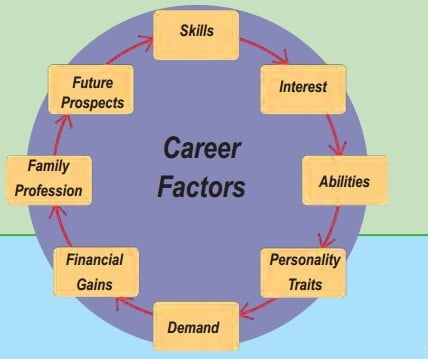
2. An Acroslic is a form of writing where the first letters in each of the lines form another word.
For example FRIEND
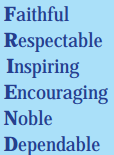
Prepare on your own such acrostics for-
- Your dearest family member
- Name of your best friend
- A quality or feeling
- Any profession
Question 1.
Prepare your own such acrostics for:
Your favourite family member.
Name of your best friend.
A quality or feeling.
Any profession.
Answer:
1. Best friend: TEJAL
True
Efficient
Jolly
Ambitious
Loving
2. Quality: Smart
Sober
Mannerly
Active
Radiant
Talented
3. Say whether the underlined words in the following sentences are used as a Noun or Verb or Adjective.
Question 1.
(a) I walk to school everyday. (………….)
(b) I go for a walk everyday. (………….)
(c) They gave me a gift everyday. (………….)
(d) You can gift her a story book. (………….)
(e) It was sold as a gift pack. (………….)
(f) They bought a new house on 10th street. (………….)
(g) The water – tanks leak a lot. (………….)
(h) The old-age home houses loo aging and homeless people. (………….)
Answer:
(a) I walk to school everyday. – Verb
(b) I go for a walk everyday – Noun
(e) They gave me a gift everyday – Noun
(d) You can gift her a story book – Verb
(e) It was sold as a gift pack – Adjective
(f) They bought a new house on 10th street – Noun
(g) The water-tanks leak a lot – Verb
(h) The old-age home houses 100 aging and homeless people. – Verb
English Workshop:
1. Complete the following web with the words associated with the passage and the given title :
Question 1.
Complete the following web with the words associated with the passage and the given title
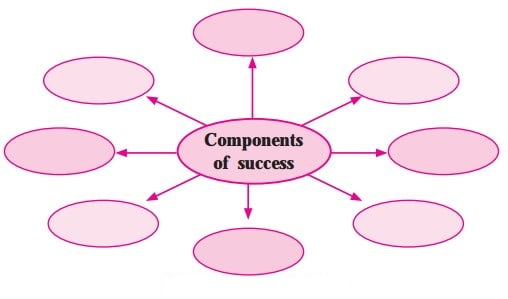
Answer:
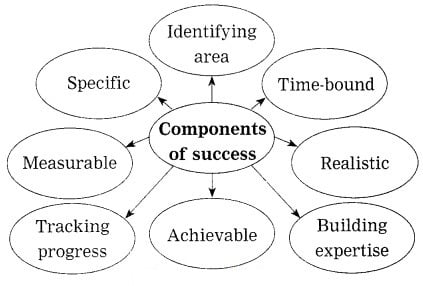
2. (A) Pick out examples from the text that support each of the following facts :
Question a.
Goals should be achievable.
Answer:
Example: We can’t become a President, a Prime Minister, but we can hope to hold the office of an important social worker and deliver results.
Question b.
A time-limit should be set to achieve goals.
Answer:
Example: To reduce weight we know how to go about it. But without consistent time-bound action, it never becomes a reality. It may be exercise, diet and stress-free thoughts. All these have to be practised and implemented within a deadline.
Question c.
A specific field/area has to be fixed to achieve goals.
Answer:
Example: If it is building a house, what exactly is the capacity required and how long can it stretch?
Question d.
Good results depend upon the quality and quantity of work put in.
Answer:
Example: Life is like a trumpet. If we don’t put anything in, we can’t get anything out.
Question e.
A benchmark is needed to track progress.
Answer:
Example: While playing football, a player’s exact role and position has to be clearly defined.
3. Complete the following sentences.
Question 1.
Complete the following sentences
(a) SMART goals are …………….
(b) Two valuable assets of setting goals are …………
Answer:
(a) SMART goals are a methodology of thinking I that helps people reach success.
(b) Two valuable assets of setting goals are-a ! sense of originality and a stepping stone to illuminate the path.
4. Read this quote.
‘If we don’t put anything in, we can’t get anything out.’ Guess the meaning. Discuss in pairs and find similar quotes that bring in the same meaning.
Question 1.
‘If we don’t put anything in, we can’t get anything out.’ Guess the meaning. Discuss in pairs and find similar quotes that bring in the same meaning.
(a) You reap as you sow
(b) Input is equal to output
(c) …………………………….
(d) …………………………….
(e) …………………………….
Answer:
(a) As you sow, so shall you reap.
(b) Input is equal to output.
(c) No pains, no gains.
(d) Nothing ventures, nothing have.
(e) The longer you work, the more you get.
(f) Well begun is half done.
5. Drafting a Speech. Discuss in groups each block and make notes about it.
Question 1.
Drafting a Speech. Discuss in groups each block and make notes about it.
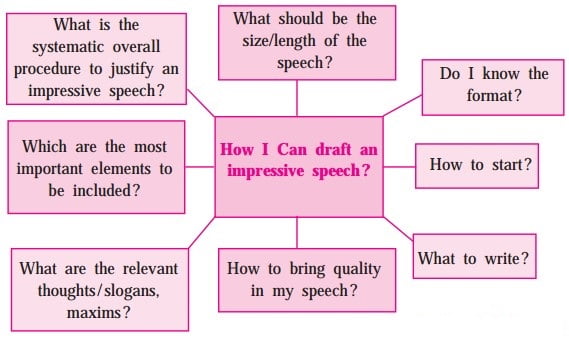
Answer:
Do it yourself.
6. Speech development
(A) Content
(a) Greeting and introduction of the topic
(b) Exposition of main theme/clarity of message/organised thoughts and ideas.
(c) Moral and practical application with examples.
(d) Conclusion
(B) Speaking Presentation
(a) Verbal clarity – pronunciation of words, voice modulation and projection.
(b) Presentation/Speaking style – mannerism, audience eye contact, ability to keep the audience engaged.
(c) Confidence – gestures and expressions, stage courage
(C) Useful phrases and vocabulary
(a) It’s pleasure to see you all/I am happy to see you today/It’s good to see you all here.
(b) Today’s topic is ………../My talk is about………….. My topic is …………….
(c) The purpose/aim of this speech. …………
(d) I will focus on one/two/three major issues.
(e) If you have any question, feel free to ask me.
Answer:
Do it yourself.
7. Dos and Don’ts for delivering a speech. Add some more points.
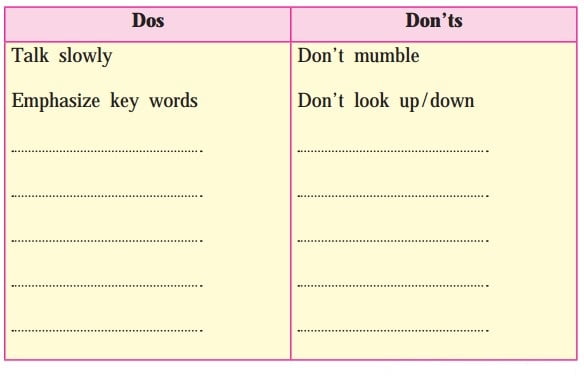
Answer:
Dos | Don’ts |
Talk slowly | Don’t mumble |
Emphasize keywords | Don’t look up /down |
Be confident | Don’t use too many hand gestures |
Maintain a good posture | Don’t keep your speech too lengthy |
Make eye contact with the entire audience | Don’t repeat the same words multiple times |
8. You are going to participate in interschool elocution competition. The subject given to you is “How to achieve success in life.” Draft a speech to present it, in a competition.
Question 1.
You are going to participate in interschool elocution competition. The subject given to you is “How to achieve success in life.” Draft a speech to present it, in a competition.
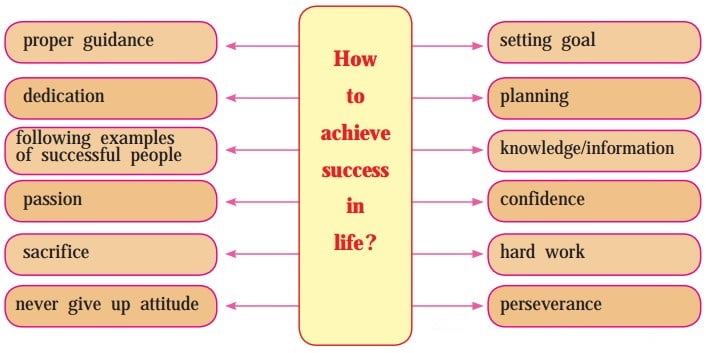
Answer:
How to achieve success in life?
Honourable chairperson, respected headmaster, teachers and my dear friends. Today I am going to give my speech on “How to achieve success in life.” I request you to listen to me carefully. So my friends, success is very important in everyone’s life.
Everyone has a dream of becoming a successful human being in life. There is a good saying that, “Success is a journey and not a destination.” How true it is! If we look at the life of all successful people, we realize the truthfulness of the statement. The definition of success is different for every person. For a child, success is to solve a puzzle, for a S.S.C. student, success is to get good marks, for a businessman, success is to get a contract and for grandparents, success is to see the whole family live happily together.
Everyone wants to become rich and successful in life. To achieve ambition, there are many steps which are to be followed. First of all, we have to set our goal, means we have to decide what we are and what we want to be. So proper plan and execution of the plan are very important. The tragedy of life does not lie in not reaching the goal, the tragedy lies in having no goal to reach.
For a great success we need a lot of confidence, patience, knowledge, perseverance and hard work. We should not waste our time because time is money. Don’t compare yourself with any other person in the world. If you do so you are demeaning yourself. The main thing is that we should always think positively and never give up hope. Many of our failures are the people who did not realize how close they were to success when they gave up.
Always remember that the word “Impossible” means, I’m possible and if destiny is accompanied with the three D’s : determination, dedication and devotion, then everything becomes possible. We should learn from our own mistakes. We should always follow in the footsteps of great, successful people. Let’s take an example of Dhirubhai Ambani.
He was born in a poor family, but struggled a lot to achieve his ambition and never gave up hope because he knew that there is always a room at the top. He kept the hope alive in his heart and tried his level best and as you know he became one of the richest industrialists in the world. After all, no gains, without pains.
There is a great saying that successful people do not do different things, they do the things differently. So work hard, continuously. God’s blessings are always there with you. Thank you for listening to me carefully.
Jai Hind.
9. Project Work :
Your goal, this year, is to successfully pass out from secondary school. So let us be SMART and note down the following.
(a) Specific Area :
(Subjects) and number of units/lessons
1. English 4 units
2. ………………..
3. ………………..
4. ………………..
5. ………………..
6. ………………..
(b) Measurable :
Comparison of scores in previous examinations and in recent one.
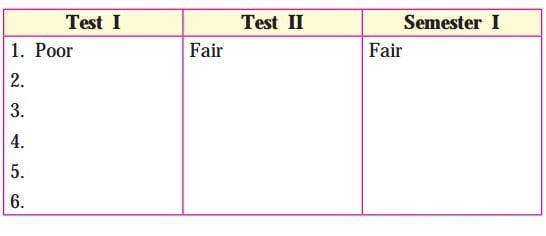
(c) Achievable goal :
(Target scores/performance in SSC Exams.)
1. Good %
2. ……………
3. ……………
4. ……………
5. ……………
6. ……………
(d) Realisitc approach :
Plan of action that matches with your expertise/resources.
For example :
1. Make a study time table and follow it regularly.
2. ……………………………………………………..
3. ……………………………………………………..
4. ……………………………………………………..
5. ……………………………………………………..
(e) Time-bound Action :
Days required for revision
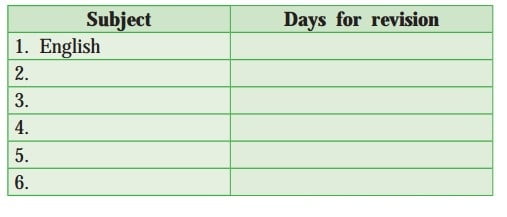
Answer:
Do it yourself.
Language Study:
Gerund:
When the – ‘ing’ form of a verb is used as a noun, it is known as a gerund a verbal noun. For example, The fighting went on. Here, we see that the – ‘ing’ form of the verb ‘fight’ is used as a subject in ‘The fighting went on’. It does a work of a noun.
Read the following examples of gerunds:
- Gardening is an art.
- Cooking is a science.
- I enjoy reading poems.
- I like reading more than writing.
Rewrite the above sentences using other appropriate gerunds in place of the given here.
Question 1.
Rewrite the above sentences using other appropriate gerunds in place of the given here.
Answer:
- Painting is an art.
- Banking is a science.
- I enjoy acting.
- I like riding more than swimming.
Infinitives:
Sometimes the form of a verb in a sentence names the action but does not change according to tense, number or person. Such a form is known as a non-finite form or an infinitive. An infinitive is used with or without ‘to’.
Examples: How did people first begin to drink tea? Can you name the beverage?
Underline the infinitive in the following sentences.
It was funny to read words that stood still.
Can I read the book?
To be or not to be – that is the question.
Question 1.
Underline the infinitive in the following sentences :
(The answers are directly given and underlined.)
Answer:
- It was funny to read words that stood still.
- Can I read the book?
- To be or not to be – that is the question.
Finite:
Underline the verbs and choose the correct option from the brackets.

Thus, we see that verb forms show tense, number, etc. Here, the verb form changes according to the subject. A verb form which is decided by and changes according to the subject of the sentence is known as a Iuikite verb.
Example: ‘You are very kind.’ If the subject ‘you’ is changed to ‘she’, the sentence will be ‘She is very kind.’
Now change the verb form according to the change in the subject.
- I don’t know: Change ‘I’ to ‘She’ ……….
- My father knows: Change ‘My father’ to ‘We’ ……….
- I am following in your footsteps: Change ‘I’ to ‘He’ ……….
Underline the gerund/present participles/infinitive.
(a) Setting goal may appear easy, but it is quite challenging.
(b) Quantifying goals provide specific ways to track progress.
(c) It is important to create goals that are within a current skill set or area of expertise.
(d) We need to bring down life images down to earth and plan to execute our strategies.
(e) Finding the right footing, precisely mastering the skills and getting to the next place, all depend on how we approach and tackle the problem.
Classify the following words in their respective columns.
tackle, trumpet, directly, execute, aggressive, natural, absence, exactly, achieve, clearly, imagination, precisely, create, important, expert, specific. of, if, and, oh, from, we, but, it.

Changing word class:
Sometimes, the word class of a word changes without adding any prefix or suffix. For example, ‘run’ is used as a verb. So, ‘verb’ is its word class in ‘I can run faster than him.’ But when ‘run’ is used as a noun, its word class changes. For example, India has to score ten more runs to win the match.’ This is called a change of word class. Look at the following examples. Change of word class from verb to noun :
‘I doubt if I can write as fast as you can’ (verb). I have a doubt about this topic (noun). Similarly : laugh, walk, catch, throw, turn
Change of word class from noun to verb :
‘Remove the potato peels (noun). Peel the potato (verb).
‘She works as a nurse (noun). You have to nurse a patient till he/she recovers (verb).
Change the verb form according to the change in the subject.
- I don’t know: Change ‘I’ to ‘She’ ……….
- My father knows: Change ‘My father’ to ‘We’ ……….
- I am following in your footsteps: Change ‘I’ to ‘He’ ……….
Question 1.
I don’t know. (Change T to ‘She’.)
Answer:
She doesn’t know.
Question 2.
My father knows it. (Change ‘My father’ to ’We)
Answer:
We know it.
Question 3.
I am following in your footsteps.
(Change T to ‘He’)
Answer:
He is following in your footsteps.
Underline the gerund/present participles/infinitive.
(a) Setting goal may appear easy, but it is quite challenging.
(b) Quantifying goals provide specific ways to track progress.
(c) It is important to create goals that are within a current skill set or area of expertise.
(d) We need to bring down life images down to earth and plan to execute our strategies.
(e) Finding the right footing, precisely mastering the skills and getting to the next place, all depend on how we approach and tackle the problem.
Question 1.
Underline the gerund/present participles/infinitive.
(Answers are directly given.)
(a) Setting goal may appear easy, but it is quite challenging.
(b) Quantifying goals provide specific ways to track progress.
(c) It is important to create goals that are within a current skill set or area of expertise.
(d) We need to bring down life images down to earth and plan to execute our strategies.
(e) Finding the right footing, precisely mastering the skills and getting to the next place, all depend on how we approach and tackle the problem.
Classify the following words in their respective columns.
Question 1.
Classify the following words in their respective columns.
(Answers are directly given.)
vision, professional, natural, achieve, originality, 1 simply, failure, absence, expert, specific, easily, thrive, appear, five
Answer:
Nouns | Adjectives | Adverbs | Verbs |
vision | natural | simply | achieve |
professional | expert | easily | thrive |
originality | specific | appear | |
failure | five | ||
absence |
Question 2.
Classify the following words in their respective columns.
(Answers are directly given.)
improvement, exactly, achievement, exact, clearly, important, create, aggressive, skill, help, hope, ability, defensive.
Answer:
Nouns | Adjectives | Adverbs | Verbs |
improvement | exact | exactly | create |
achievement | important | clearly | help |
skill | aggressive | hope | |
help | defensive | ||
hope | |||
ability |
Question 3.
Classify the following words in their respective columns.
(Answers are directly given.)
increase, consistent, imagination, execute, directly, tackle, reach, successful, expertise, unrealistic, reduce, precisely, hesitation, problem, valuable
Answer:
Nouns | Adjectives | Adverbs | Verbs |
imagination | consistent | directly | increase |
expertise | successful | precisely | execute |
hesitation | unrealistic | tackle | |
problem | valuable | reach | |
reduce |
Question 4.
Classify the following words in their respective columns.
(Answers are directly given.)
ah, of, if, and, oh, from, we, but, it, hurrah
Answer:
Pronoun | Preposition | Conjunction | Interjection |
we | of | if | oh |
it | from | and | ah |
but | hurrah |
Read the following passage and do the activities :
Simple Factual Activity :
Question 1.
Write whether the following statements are True or False :
Answer:
- We won’t achieve our goals unless we take action to achieve them. – True
- We all don’t have natural talents. – False
- The skill must be stronger than will. – False
- Goals help to steer a course of life. – True
Question 2.
Write whether the following sentences are True or False : (Board’s Model Activity Sheet)
Answer:
- Quantifying goals provides specific ways to track progress against goals. – True
- Setting goals that can’t be completed in the designated period of time. – False
- It is important to create goals that are within one’s current skill set or area of expertise. – True
- Being realistic will make it difficult to be successful at attaining goals. – False
Question 3.
Complete the following sentences with the help of the passage :
(Answers are directly given and underlined.)
Answer:
- Specific goals make it easier to set parameters and work towards the goal.
- Achievable goals may act like stepping stones to help meeting broader goals.
- Expecting to become an expert in a short amount of time is unrealistic.
Question 4.
Complete the sentences with the help of the information in the passage :
(Answers are directly given and underlined.)
Answer:
- For reducing weight, exercise, diet and stress- I free thoughts should be practised and implemented without hesitation.
- Vision, wishes, intentions and dreams spark off imagination and encourage us to define where we want to reach.
- The quality and quantity of energy we put forth, directly impact the results.
- Success is a walk in the dark.
Complex Factual Activities:
Question 1.
Complete the web :
(Answer is directly given.)
Answer:
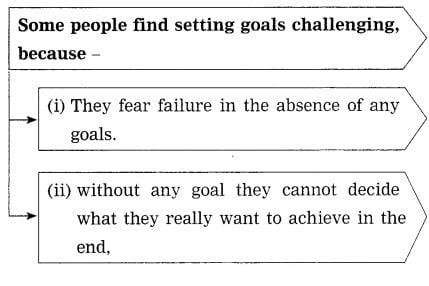
Question 2.
Complete the sentences using the information from the passage :
(Answers are directly given and underlined.)
Answer:
- If we use our talent to set our goal in life, we can easily get success in life.
- One has to decide what one wants to achieve in the end.
- Setting goals sometimes appear easy but for some it is quite challenging.
- We shall not achieve our goals if we do not take action to achieve them.
Question 3.
How does quantifying goals help us?
Answer:
Quantifying goals help us to provide detailed and exact ways to track progress against goals. This makes it easy to benchmark performance throughout the goal period, including areas to improve. In the game of football, the player’s exact role and position has to be clearly defined.
Question 4.
What factor is unreal, while setting goals?
Answer:
Expecting to become an expert in a short amount of time is an unreal factor, while setting goals. Building expertise always takes time.
Activities based on Vocabulary:
Question 1.
Find from the passage adjectives for :
- nature
- value
- success
- ease
Answer:
- nature – natural
- value – valuable
- success – successful
- ease – easy
Question 2.
Find from the passage adjectives for the following :
- area
- period
- role
- stones
- picture
Answer:
- specific – area
- goal – period
- exact – role
- stepping – stones
- clear – picture
Question 3.
Cross the odd man out:
(Answers are directly given.)
Answer:

Question 4.
Write from the passage noun forms of the following :
(Answers are directly given.)
Answer:
- accountable – accountability
- real – reality
- imagine – imagination
- hesitate – hesitation
Question 5.
Write from the passage words related to qualities required for success :
Answer:
accountability, consistent, vision, wish, intention, dream, imagination, execute, energy, skills, approach, strategy.
Activities based on Contextual Grammar :
Question 1.
Underline the gerund /present participles/ infinitives:
(Answers are directly given and underlined.)
Answer:
- After all, one has to decide what one wants to achieve in the end.
- If we use that talent to set in our Life, we call easily get success in Life.
- They help to steer a course of our Life.
Question 2.
Underline the Present Participles/ Infinitives :
(Answers are directly given and underlined.)
Answer:
- It makes it easier to set parameters.
- These goals may act like stepping stones to help broader goals.
- So expecting to become an expert in a short time is unrealistic.
- Being realistic will make it easy to be successful at attaining goals.
- You must have the ability to adhere to that picture.
Do as directed:
Question 1.
We all have natural talents,
(Add a question tag.)
Answer:
We all have natural talents, haven’t we?
Question 2.
The will must be stronger than the skill.
(Begin with-The skill must not be and change into positive degree.)
Answer:
The skill must not be as strong as the will.
Question 3.
It is important to create goals.
(Pick out the infinitive)
Answer:
to create.
Question 4.
These goals may act like stepping stones.
(Pick out the present participle)
Answer:
stepping.
Question 5.
Life is like a trumpet. (Frame a Wh-question to get the underlined word as answer.)
Answer:
What is life like?
Question 6.
Establish time parameters around each goal. (Rewrite the sentence beginning with ‘Let’and change the sentence into passive voice.)
Answer:
Let time parameters around each goal be established.
Question 7.
If we don’t put anything in, we can’t get anything out. (Rewrite the sentence using ‘unless’ in the beginning.)
Answer:
Unless we put anything in, we can’t get anything out.
Question 8.
It will help increase focus and accountability.
(Identify the Tense of the sentence.)
Answer:
Simple Future Tense
Question 9.
Complete the words by using correct
- d r_a m
- g o_l s
- s m_r t
- r i_h t
Answer:
- dream
- goals
- smart
- right
Question 10.
Put the following words in alphabetical order :
1. situation, some, specific, skill
2. stretch, involve, goal, rubric
Answer:
1. situation, skill, some, specific
2. goal, involve, rubric, stretch
Question 11.
Punctuate the following sentences :
1. Where are you going at this time said raja to smeeta
(2) The servant said what a kind nobleman he is
Answer:
1. “Where are you going at this time?” said Raja to Smeeta.
2. The servant said, “What a kind nobleman he is!”
Question 12.
Make four smaller words each (minimum 3 letters each) using the letters in the word : measurable
Answer:
meal, able, sure, marble
Question 13.
Write related words as shown in the example :
(Answer is directly given and underlined.)
Answer:
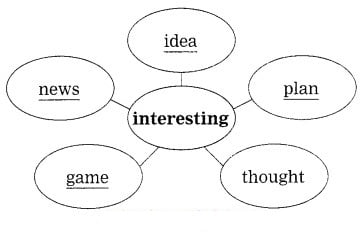
Question 14.
Complete the following word-chain based on nouns. Add four words, each beginning with the last letter of the previous word :
Tree → …………. → …………. → …………. → ………….
Answer:
Tree → egg → goat → team → mat.
1. Attempt any one :
a. Make your own meaningful sentence using the phrase ‘down to earth’ :
Answer:
He has achieved many awards but he remains down to earth all the time.
OR
b. Add a clause to the following sentence to expand it meaningfully :
I asked him
Answer:
I asked him if he was ready to come with me.
2. Attempt any one :
a. Add a prefix or suffix to make new words.
1. correct
2. fear
Answer:
1. incorrect
2. fearful/fearless
OR
b. Make meaningful sentence using any one of the following words :
1. correct
2. fear
Answer:
1. Whatever he said was correct.
2. The girl was shaking with fear.
Personal Response :
Question 1.
Do you have a goal in your life? What efforts will you make to achieve it?
Answer:
Yes, I do have decided my goal in my life. I aspire to be a top musician. To achieve my goal I will ‘ keep on trying and going ahead despite difficulties with the help of talent and hard work. I am sure that my faith in God, my perseverance, courage and , positive thinking will lead me to success.
Question 2.
Why do think that your goal should be achievable?
Answer:
I think, I must be very careful about choosing my goal. My goal must be achievable. That should be completed within the set deadline.
I should consider my talent and ability and then go for such a goal which will not remain incomplete and unsuccessful.
Question 3.
Why is it necessary to set our goals realistic?
Answer:
It is important to create goals that are within j your current skills limit. You must be expert in the area you have undertaken. Your approach towards your goal must be realistic and positive. You must have to work hard and know how and when you can | attain the goal.
Question 4.
Do you think, your attitude will change sifter your great success? Explain.
Answer:
No, I don’t think my great success will change my attitude towards the world. I shall be as humble as before. I shall not allow my success to go to my head. I shall be always down to earth. I will never trumpet my achievement and will express my views about my success without sounding boastful. Nothing will change in my life.
Question 5.
‘If we don’t put anything in, we can’t get anything out.’ Explain,
Answer:
When we wish to achieve something we must have to give time and put forth every quality and quantity of our energy. You have to prepare plan and execute it meticulously, concentrating on your goal. We will have to put everything at stake to get fruitful results. Efforts we put in the process wholeheartedly can only give us the output (success) we desire. The more you work in the direction of success, the more benefits you get.
Writing Skill:
Drafting a Speech :
Points: Understand the given topic for the speech – Collect all information from all sources – put your thoughts, ideas clearly, systematically in correct sequence – use good but – simple and impressive language – use slogans, quotes, maxims, proverbs, etc. – give examples to justify your points of view – emphasize your good points – conclude with thanks.
Delivering the Speech : Begin with greetings – introduce the topic – modulate your voice – be bold, straightforward and confident – look straight at the audience – speak slowly but loudly and clearly – avoid odd mannerisms or gestures – impress the audience – end the speech with thanks to audience.
Activities:
Question 1.
Your goal, this year, is to successfully pass from Secondary School to Higher Secondary School. So let us be SMART and note down the following :
(Note : Students should try to fill in their own ideas/information in the tables given on the coursebook pages 27 and 28.)
Points :
(a) Specific area : Note down the subjects and units.
(b) Measurable : Compare the scores of previous tests.
(c) Achievable goal: Set goals/target to be achieved.
(d) Realistic approach : Make action plans to get good marks.
(e) Time-bound Action : Study, Revision-required days
Language Study:
Question 1.
Change of word class from noun to verb :
Answer:
1. Remove the potato peels (noun). Peel the potato (verb).
2. She works as a nurse (noun). You have to nurse a patient till he/she recovers (verb).